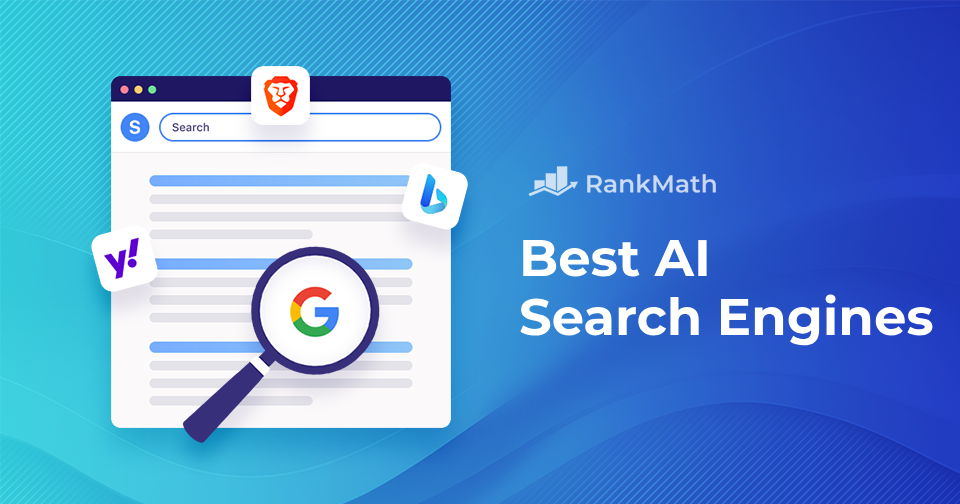AI search engines are no longer just experimental tools; they’re transforming how we find information online. From summarizing breaking news to simplifying blockchain with a pizza analogy, these platforms are changing the way we search, learn, and make decisions.
But with so many options: ChatGPT, Gemini, Perplexity, Claude, Grok, You.com, DeepSeek, Copilot Search, and Andi Search, the big question is: Which AI search engine is the best in 2026?
Instead of relying on marketing promises, we put them to the test. Over 28 carefully chosen queries, we compared nine of today’s leading AI search engines across five key areas: recency, bias, simplification, accuracy, and speed.
So, let’s explore them and see which one might be perfect for you!
1 ChatGPT Search
If you want a search engine that feels more like a conversation than a tool, ChatGPT Search is a great option. Its strength lies in contextual understanding, so instead of just matching keywords, it learns the meaning behind your questions and gives you natural, human-like answers.
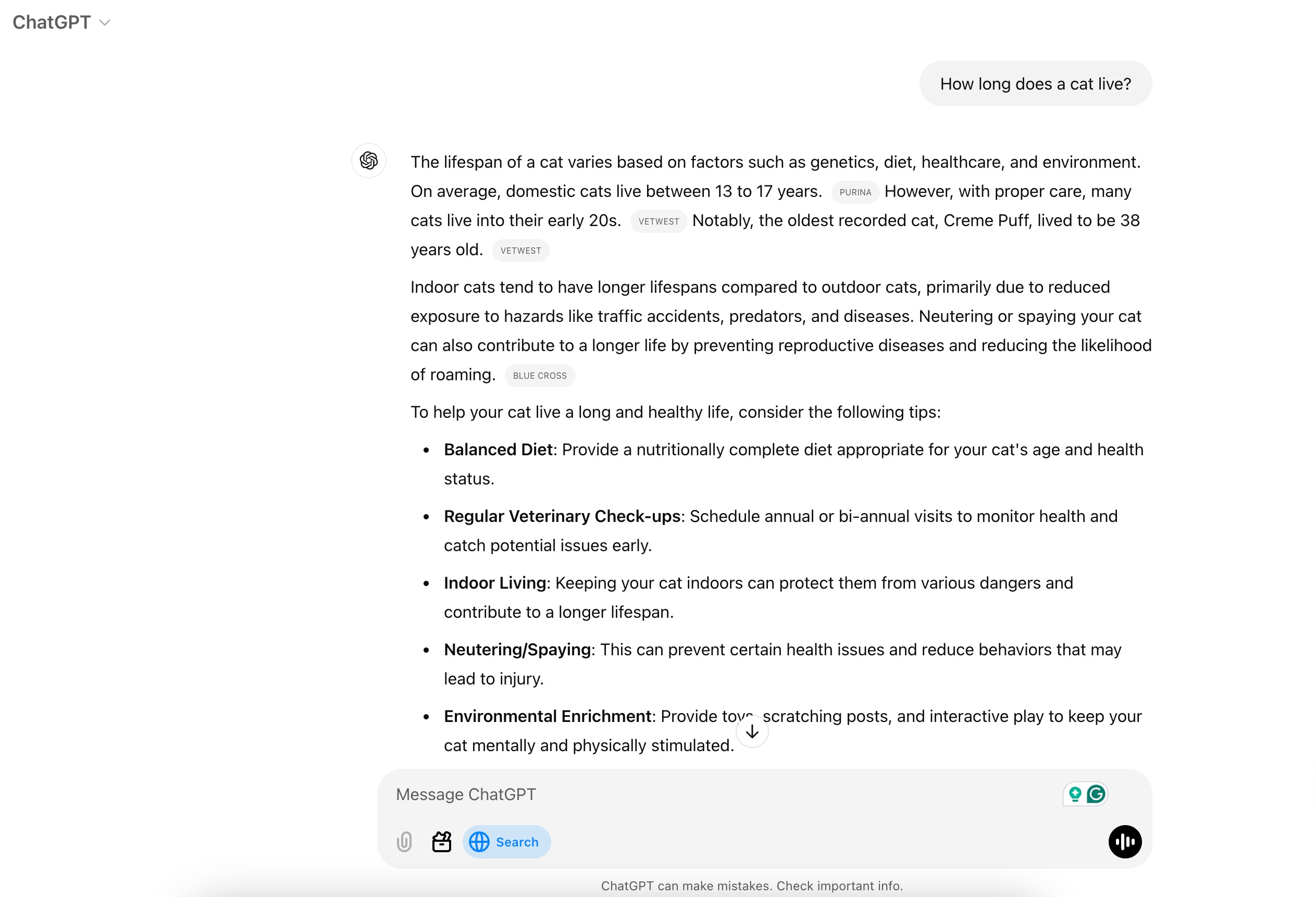
You can use ChatGPT Search across multiple platforms:
- A standalone web search page
- Desktop apps for Apple and Windows
- Mobile apps for iOS and Android
- A Chrome browser extension
- Advanced voice mode for hands-free interaction
This flexibility makes it easy to access wherever and however you prefer.
What sets ChatGPT apart is its ability to understand context. ChatGPT displays local knowledge panels for local searches, showcasing businesses with maps, images, and key information.
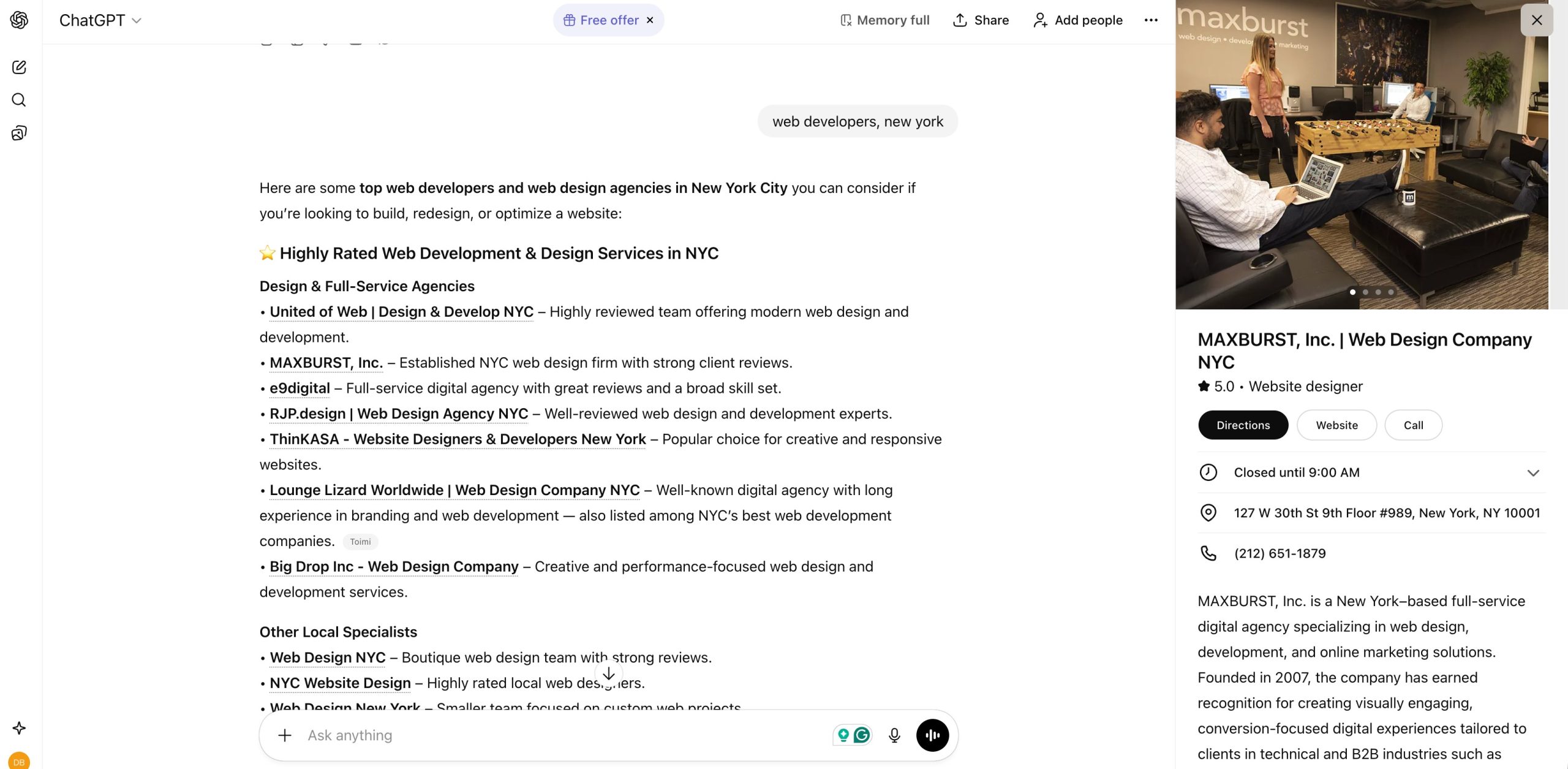
ChatGPT offers three plans, namely, Plus ($20/month), Team($25/month), and Enterprise (contact their sales team)
Test Results
- Recency & Freshness of Data: Strong, but sometimes required enabling web search.
- Bias & Neutrality: Generally neutral, chose Android in the iPhone vs. Android test.
- Simplification: Struggled with analogies, overcomplicated explanations.
- Accuracy: Among the most consistent and reliable.
- Speed: ~3.1 seconds, good performance.
2 Google Gemini
Google Gemini takes traditional search a step further by giving you smarter, more conversational results. Instead of just listing websites,
Gemini uses advanced AI to understand the context of your questions and deliver clear, detailed answers right away.
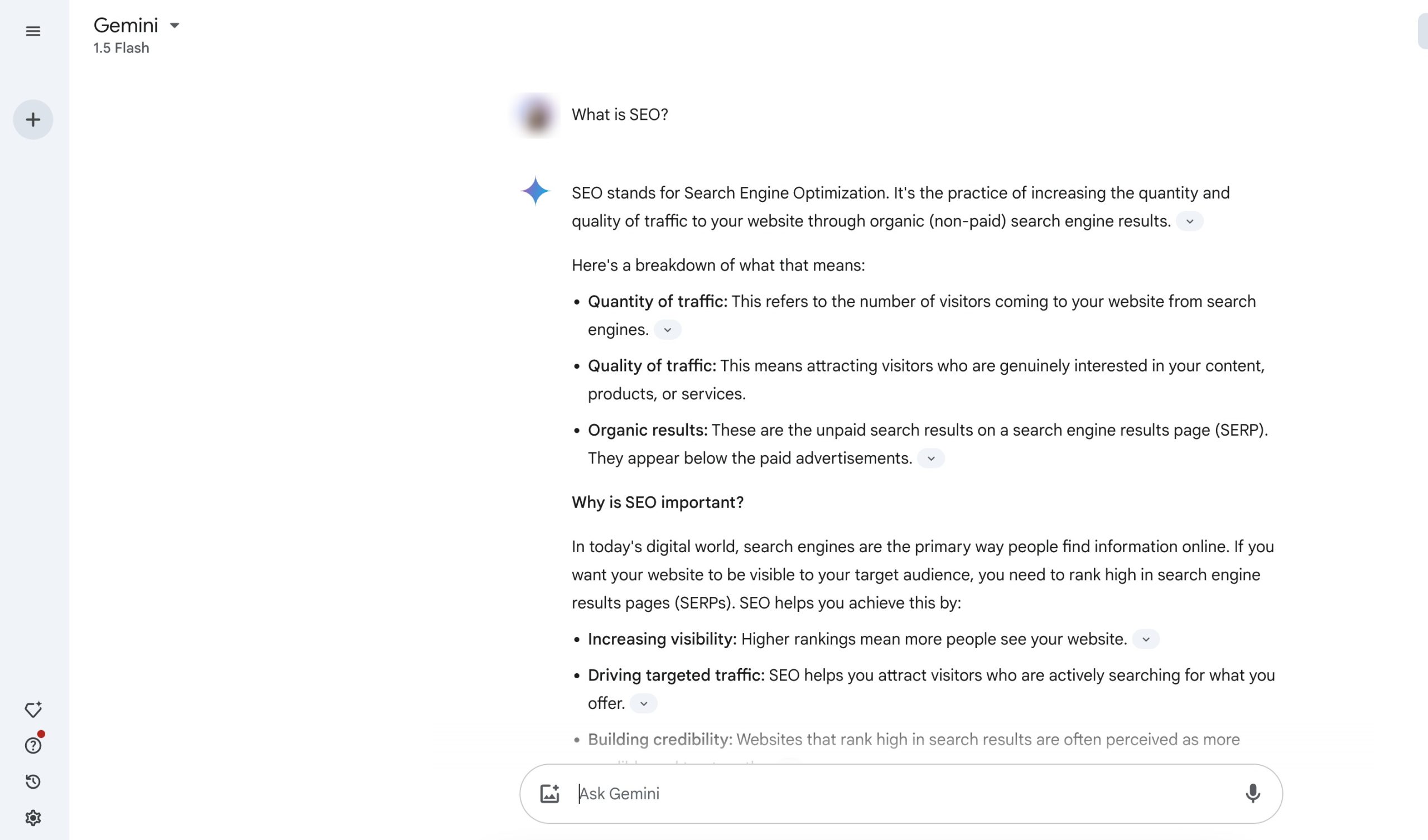
One of its standout features is multimedia search. Gemini can process text, images, and other formats, which means you can combine different types of input and still get accurate, relevant results. This makes it especially useful if you’re looking for visual explanations or need context beyond plain text.
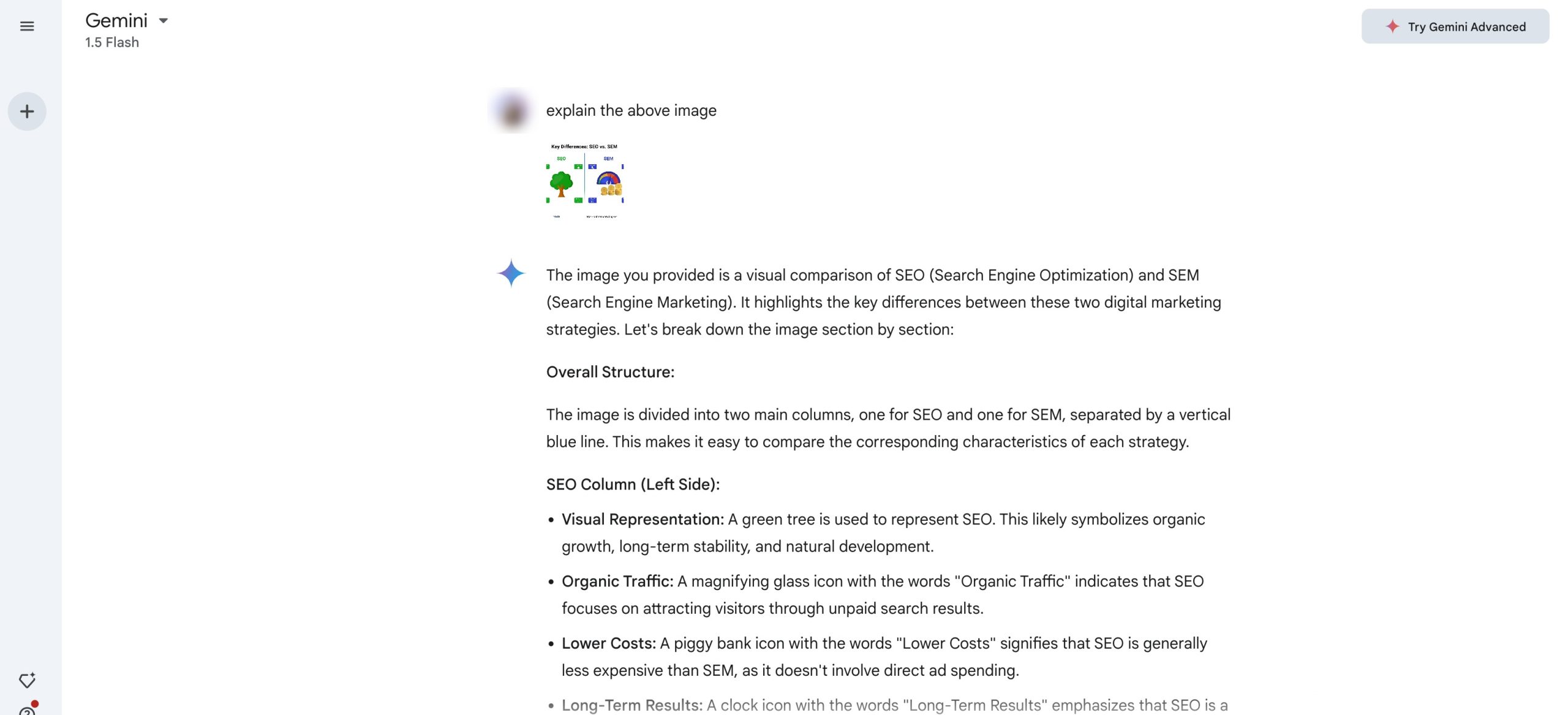
When it comes to pricing, Gemini’s AI features are free for everyday Google Search users because they’re supported by ads. However, if you’re a developer or business looking to integrate Gemini’s capabilities into your own apps, Google offers premium API plans with different pricing tiers.
Test Results
- Recency & Freshness of Data: One of the best, excellent with breaking news and local listings.
- Bias & Neutrality: Neutral and diplomatic.
- Simplification: Clear and effective explanations.
- Accuracy: Consistently strong, though weaker in sports-related queries.
- Speed: The fastest (~2.8 seconds).
3 Perplexity AI
If you want clear, reliable answers backed by sources, Perplexity AI is one of the best options.
Unlike traditional search engines that bombard you with endless links, Perplexity gives you summarized results with citations, so you can easily verify the information or dig deeper into the original sources.
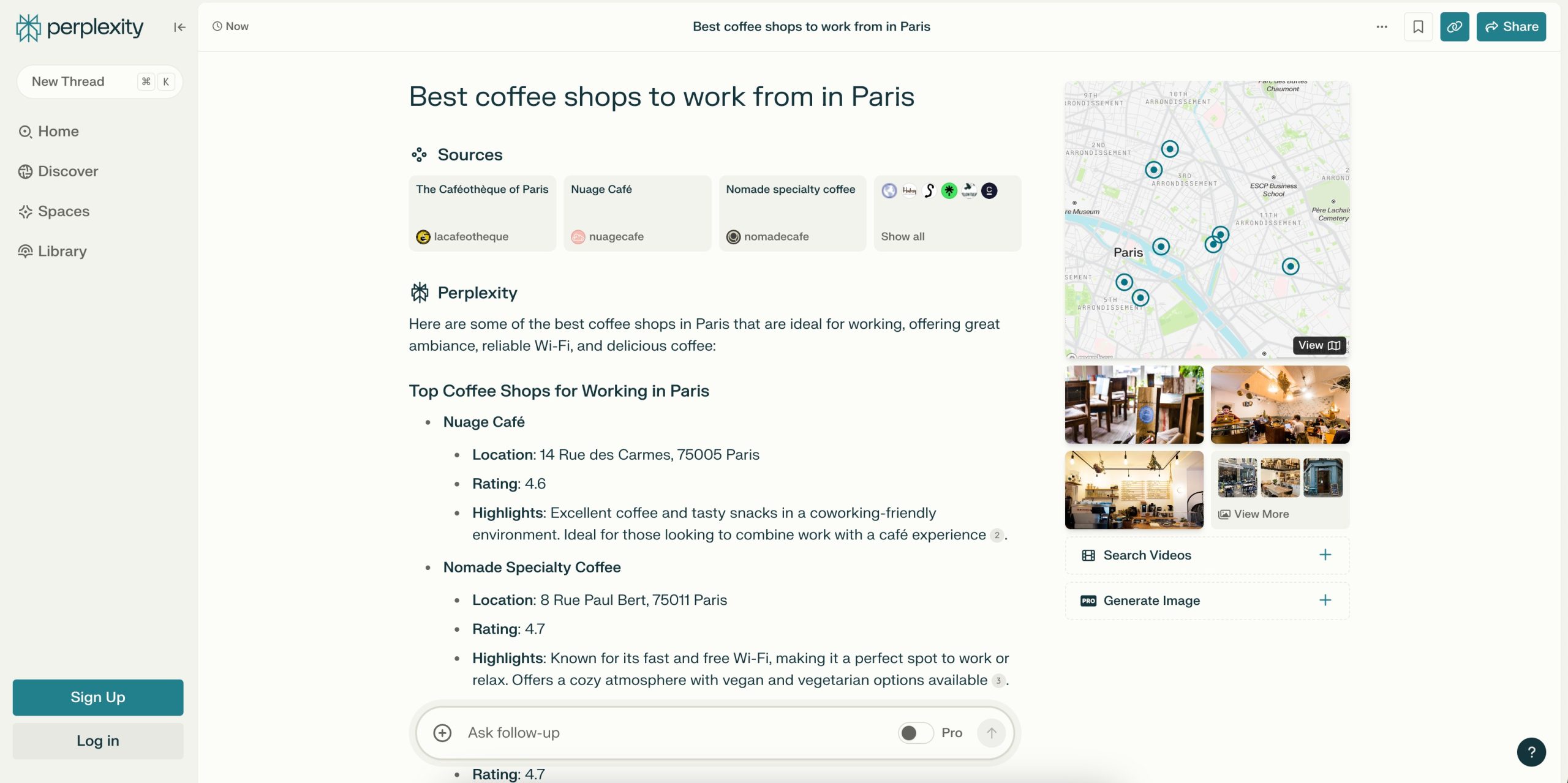
Using Perplexity feels conversational. You can ask a complex question, refine it with follow-ups, and get responses that are structured and easy to digest. This makes it especially useful if you’re researching a new topic or exploring something in detail.
The citation-based approach is what sets Perplexity apart. By showing you where its answers come from, it ensures transparency and trust, a huge advantage if you’re working on academic projects, professional research, or just want confidence that the information is accurate.
Instead of wasting time sifting through dozens of sites, you get a reliable summary in seconds, and the best part, it is freely available.
Test Results
- Recency & Freshness of Data: Handled news and sports queries well, though struggled with some local data.
- Bias & Neutrality: Stayed balanced in most answers.
- Simplification: Easy to follow explanations.
- Accuracy: Reliable, but occasionally missed details.
- Speed: ~3.3 seconds, still fast.
4 Claude
If you’re looking for a safe and straightforward AI search engine, Claude AI by Anthropic can catch your attention.
Claude is designed with a strong focus on safety, ethics, and natural language understanding. It aims to give you clear, easy-to-read answers without overwhelming you with technical jargon.
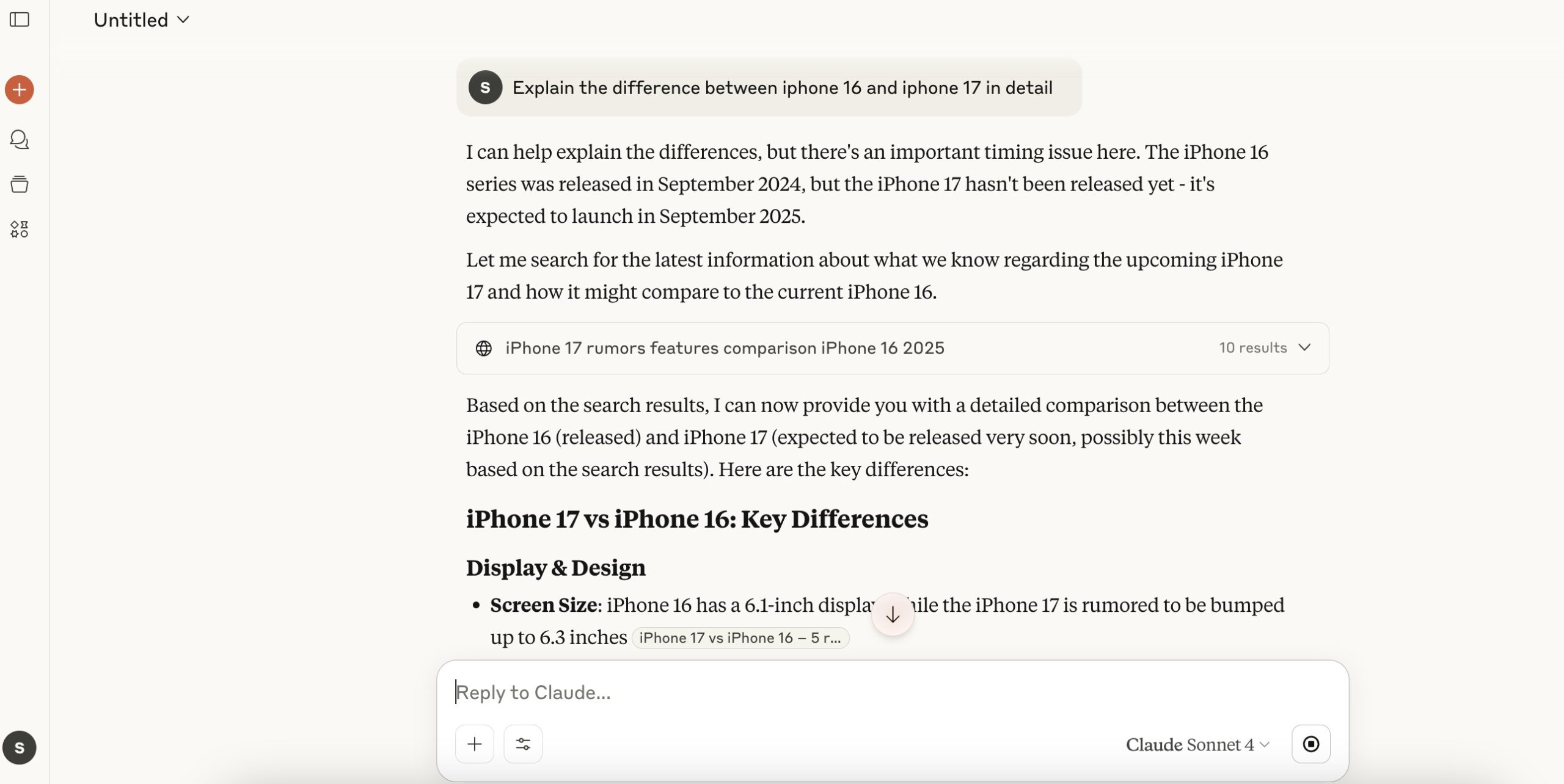
When you use Claude, the experience feels calm and cautious. It won’t push bold claims or controversial opinions, and it tries to keep explanations simple so that anyone can follow along.
However, this careful approach sometimes comes at a cost, the answers can feel too simplified and lack the depth you might need if you’re researching something detailed or technical.
Claude AI offers a free plan with basic features and limited usage, while the Pro plan ($17–$20/month) provides higher limits, Claude Code access, and productivity integrations.
Test Results
- Recency & Freshness of Data: Often outdated or limited.
- Bias & Neutrality: Neutral but bland.
- Simplification: Oversimplified answers, losing depth.
- Accuracy: Weakest overall in fact-checks.
- Speed: Average, not standout.
5 Grok
Developed by xAI, Grok has a unique personality; it’s witty, engaging, and not afraid to bring a touch of humor into its answers. But beyond its personality, Grok is also one of the most reliable and balanced AI search engines available today.
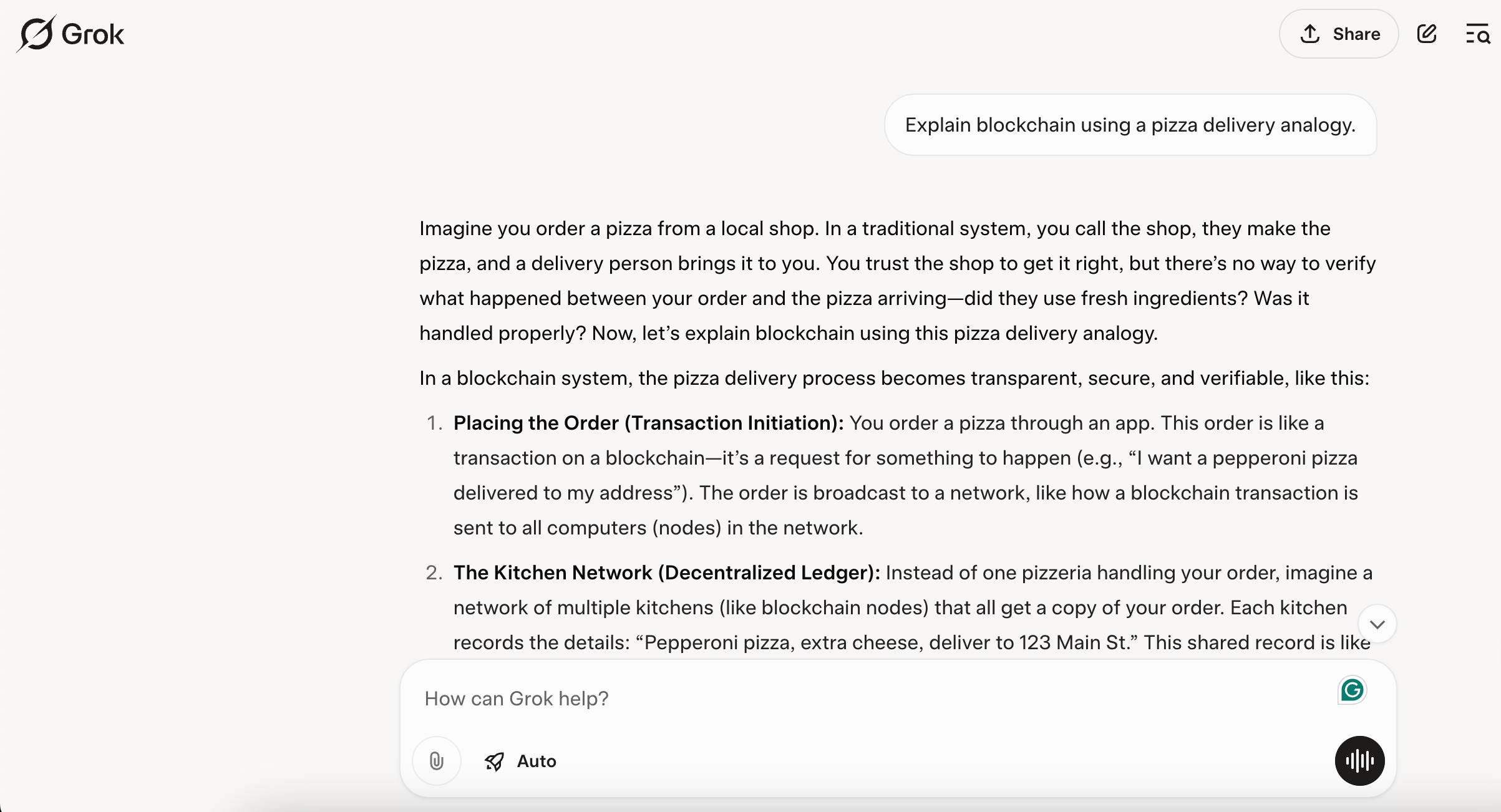
When you use Grok AI search engine, you’ll notice it’s particularly good at handling nuanced questions. Instead of giving generic responses, it considers different perspectives and explains them clearly, often using simple analogies to help you understand complex topics.
This makes it feel less like a tool and more like an intelligent companion who can break things down for you.
Grok AI offers a free tier for casual users with limited daily queries, while the SuperGrok plan ($30/month) provides full access to Grok 4 with advanced features like DeepSearch. For heavy users and developers, the SuperGrok Heavy plan ($300/month) delivers higher usage limits and early access to new features, and API access is available on a pay-per-use basis.
Test Results
- Recency & Freshness of Data: Decent, though not as strong as Gemini.
- Bias & Neutrality: The most balanced, with nuanced perspectives.
- Simplification: Strong and clear analogies.
- Accuracy: Highly consistent across tests.
- Speed: ~3 seconds, one of the fastest.
6 You AI Search Engine
You.com AI search engine is a great choice if you want more control over your search experience.
Unlike traditional search engines that only return links, You.com doubles as a productivity hub by integrating AI-powered apps and tools directly into the search engine.
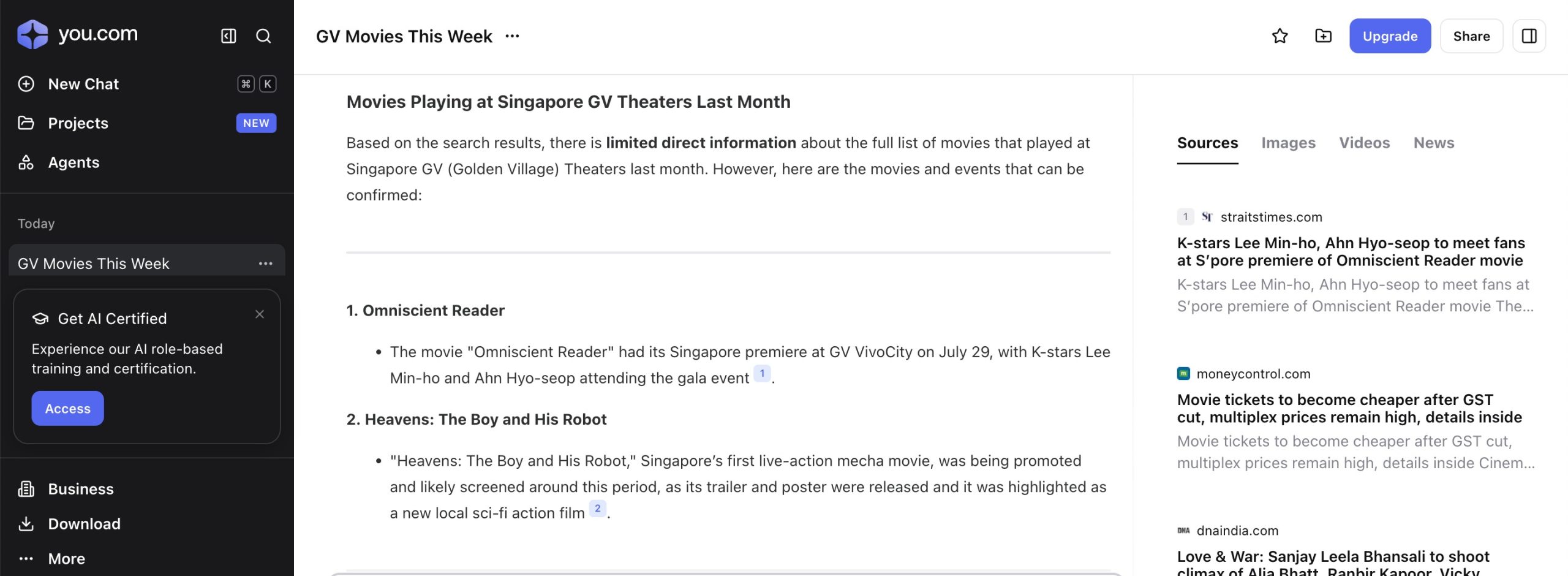
When you use You.com, you can do more than just look up information. You’ll find built-in features like:
- AI writing assistants to help you draft content,
- Code generation tools for developers, and
- Language translation for breaking down communication barriers.
This makes You.com feel like an all-in-one platform , not just a search engine, but also a workspace where you can research, create, and solve problems all in one place. It’s also privacy-conscious, giving you options to customize how your data is used.
Pricing is flexible: basic use is free, but advanced plans start at $15/month if you want access to premium features.
Test Results
- Recency & Freshness of Data: Excellent at real-time queries like movie listings.
- Bias & Neutrality: Leaned toward popular opinions.
- Simplification: Clear and accessible.
- Accuracy: Strong but inconsistent in some tests.
- Speed: Slower compared to others.
7 DeepSeek
DeepSeek AI Search Engine is built with a focus on depth and technical precision, making it stand out from engines that prioritize speed alone. It aims to deliver thoughtful, structured answers, which can be especially useful when you’re dealing with complex or technical queries that require more than surface-level information.
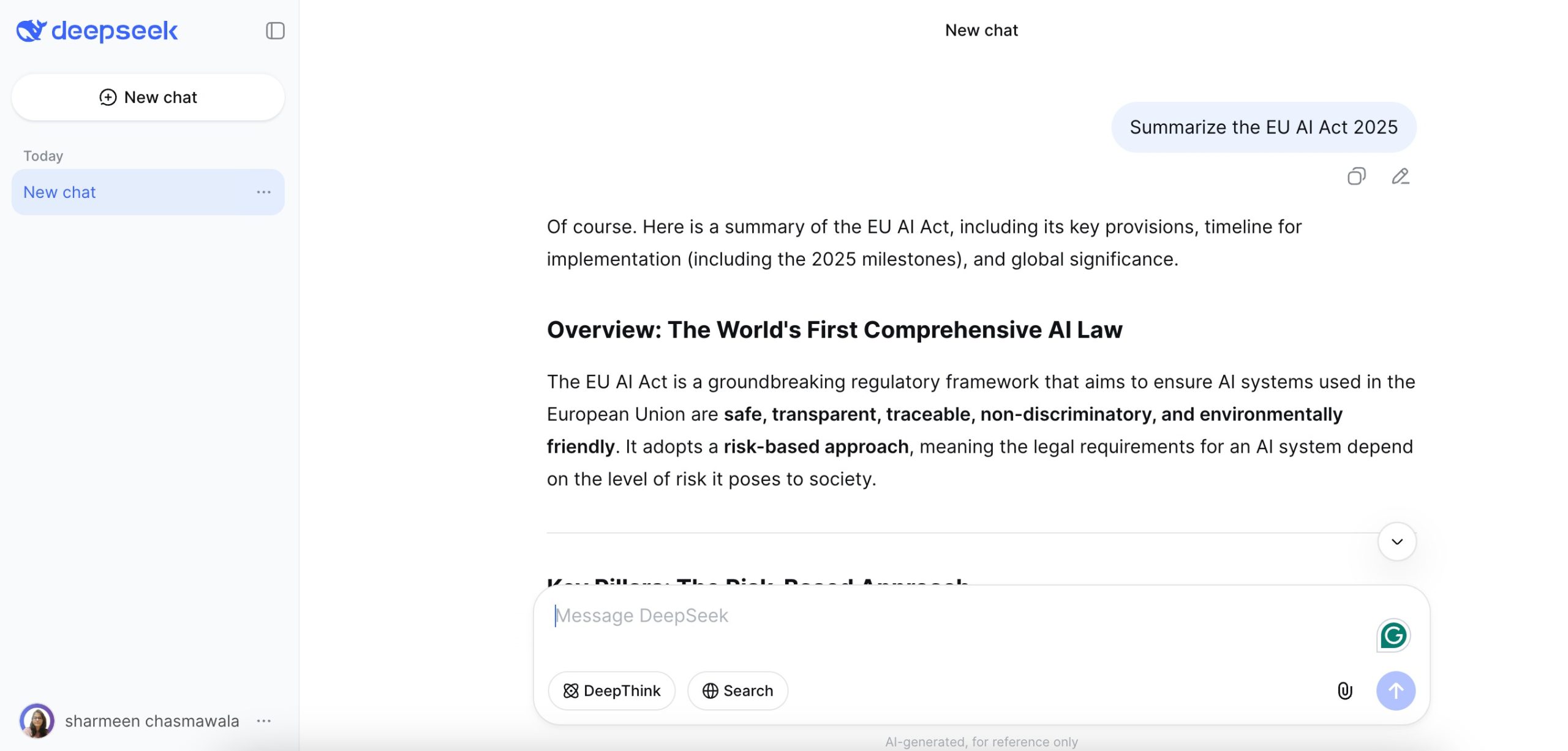
To get the most from DeepSeek AI search engine, you’ll often need to enable its search mode. Without it, the results can feel limited since it relies heavily on its internal knowledge rather than pulling in live, updated data.
DeepSeek offers a pay-as-you-go pricing model based on token usage, with DeepSeek Chat priced at $0.07 per million input tokens (cache hit), $0.27 per million input tokens (cache miss), and $1.10 per million output tokens.
Test Results
- Recency & Freshness of Data: Needed search mode enabled to stay current.
- Bias & Neutrality: Neutral, but not as nuanced as Grok.
- Simplification: Clear explanations when it worked.
- Accuracy: Decent but inconsistent.
- Speed: Slower than most.
8 Copilot Search
Based on our tests, Copilot Search delivers a balanced AI search experience, but with a few limitations you should be aware of.
You’ll find that its recency and freshness of data are mixed, especially when handling local queries, so it might not always have the most up-to-date information for your area.
The tool excels at simplifying complex information, making answers easy to read, but this comes at the cost of depth and detail.
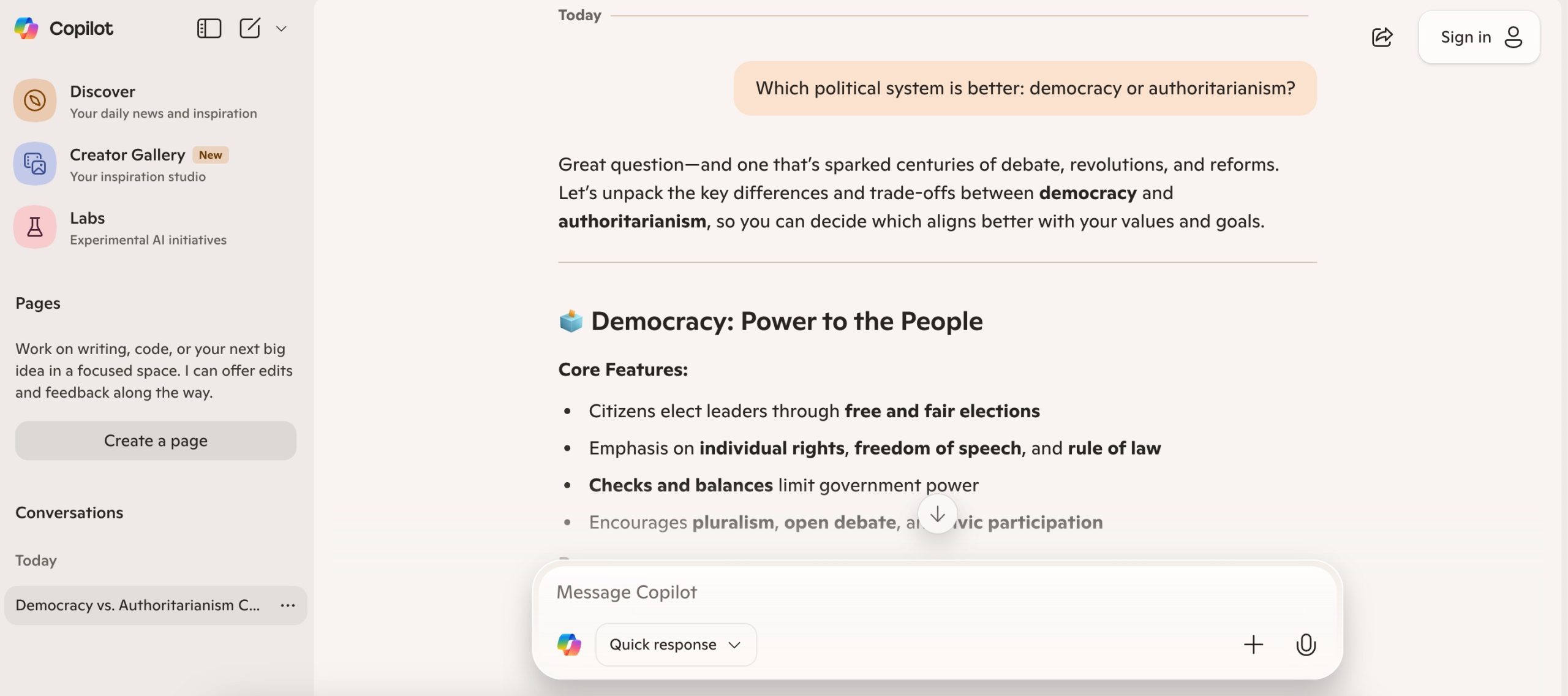
Its accuracy is average, providing reliable but not exceptional results, and the speed falls in the mid-range, you won’t experience lightning-fast responses, but it’s not too slow either.
Key features you can benefit from include its straightforward interface, readable answers, and consistent neutrality, making it a convenient choice if you want quick, simplified insights without heavy technical detail.
Test Results
- Recency & Freshness of Data: Mixed performance, not great with local queries.
- Bias & Neutrality: Neutral but surface-level.
- Simplification: Easy to read but limited depth.
- Accuracy: Average performance.
- Speed: Mid-range.
9 Andi Search
When you use Andi search engine, you’ll notice it focuses on providing interactive and AI-driven search results that feel more conversational. You can get answers quickly, often in a summarized and easy-to-read format.
Andi excels at presenting information in a visually appealing way, sometimes including charts or links to relevant sources, so you can explore further if needed.
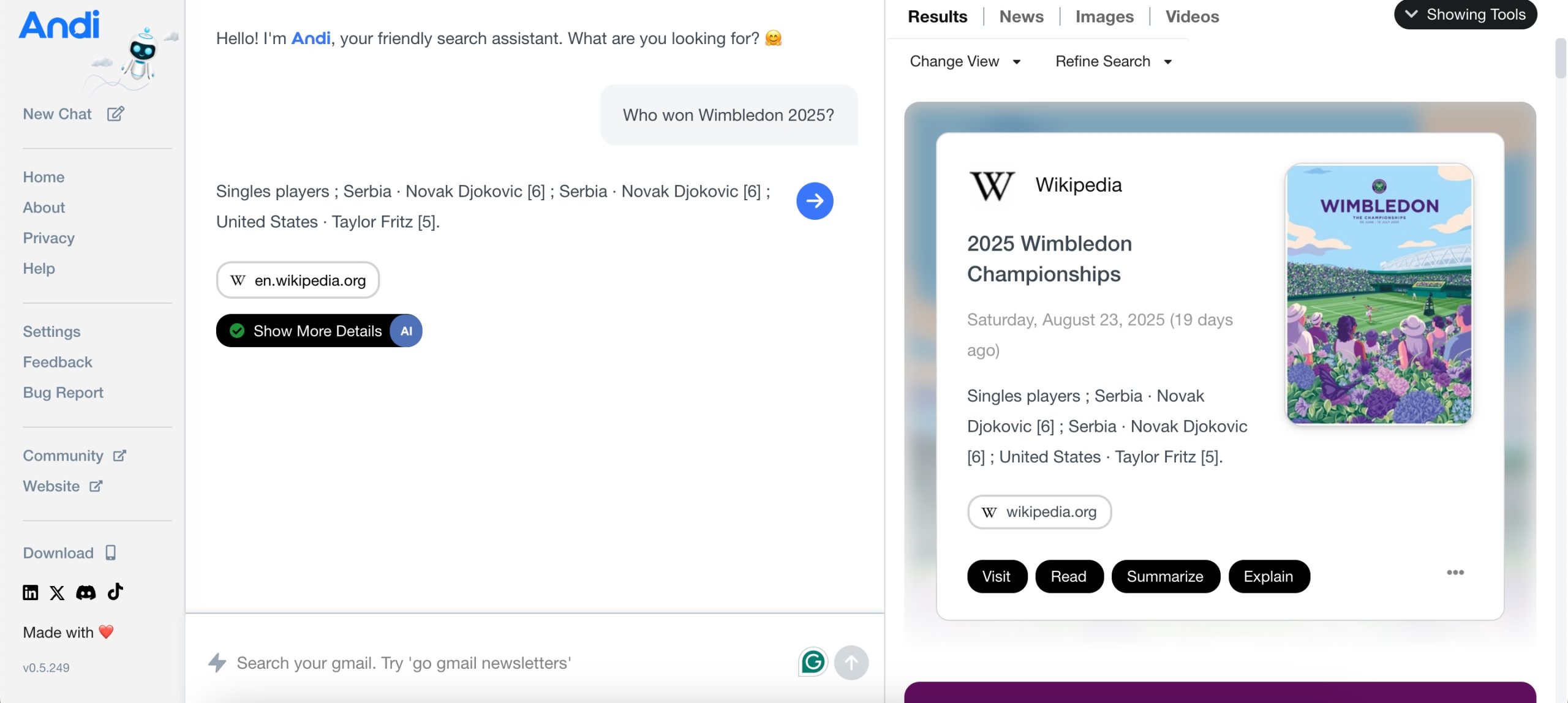
While its results are generally not so accurate, you may find that the depth and coverage vary depending on your query.
Andi is currently available for free, offering users an ad-free and privacy-focused AI search experience.
Test Results
- Recency & Freshness of Data: Weak with localized queries.
- Bias & Neutrality: Stayed balanced.
- Simplification: Creative explanations.
- Accuracy: Inconsistent, missed details.
- Speed: Faster than DeepSeek but not top-tier.
AI Search Engines Test Results
As we’ve mentioned, we tested the leading AI search engines across five key categories, and we scored them each out of 10.
Here’s how they stacked up:
| AI Search Engine | Recency | Bias & Neutrality | Simplification | Accuracy | Speed | Final Score |
| Grok | 7.0 | 10.0 | 10.0 | 8.0 | 10.0 | 45.0 |
| Google Gemini | 9.0 | 9.0 | 10.0 | 7.0 | 10.0 | 45.0 |
| ChatGPT | 7.0 | 8.0 | 9.0 | 7.5 | 9.0 | 40.5 |
| Perplexity | 7.0 | 8.0 | 10.0 | 6.5 | 9.0 | 40.5 |
| You.com | 9.0 | 8.0 | 10.0 | 6.0 | 5.0 | 38.0 |
| DeepSeek | 7.0 | 8.0 | 10.0 | 5.0 | 7.0 | 37.0 |
| Copilot | 8.0 | 8.0 | 10.0 | 6.0 | 6.0 | 37.0 |
| Claude | 7.0 | 8.0 | 10.0 | 3.5 | 8.0 | 36.5 |
| Andi | 7.0 | 8.0 | 10.0 | 4.5 | 6.0 | 35.5 |
Conclusion
AI search engines are changing fast, and each brings something unique to the table.
Based on our tests, Grok and Google Gemini lead the pack, with ChatGPT still a good, reliable choice. Depending on your needs, whether it’s speed, recency, or simplicity, you may find Perplexity or You.com a better fit.
Ultimately, the best AI search engine is the one that fits how you search. Try a few of them, and you’ll quickly discover your favorite tool for faster, smarter, and more personalized online searches.
If you like this post, let us know by tweeting @rankmathseo.
